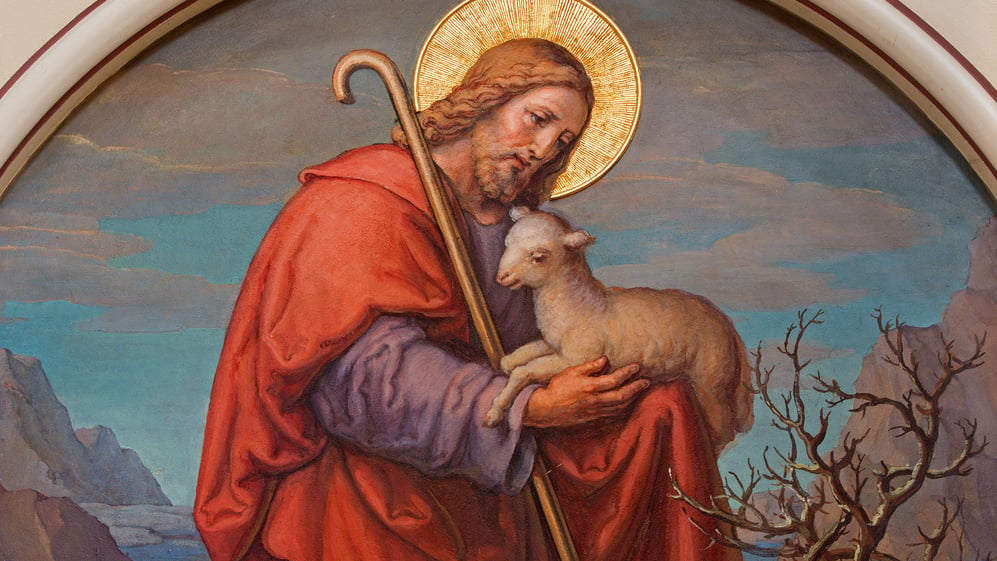“The LORD is my Shepherd; I shall not want.” Psalm 23 is one of the best-known Psalms, often a poem we turn to for refuge during times of distress or uncertainty. But why has this passage become so popular? Read from the latest Concordia Commentary, Psalms 1–50, by Timothy Saleska, answering this question below.
Why is it that certain biblical texts have been able to maintain their hold on the Christian imagination throughout history? Much of Scripture passes in and out of our memory, but there are a few texts that stay with us like glowing embers, always at hand to provide warmth when hearts grow cold. Psalm 23 is one of these texts. People want it at the funeral of their loved one so that they can warm themselves against a cold reality. This is the psalm that friends share with each other when they are afraid, not only because they may not know what else to say but also because this is the best anyone can say.
Whenever I hear Psalm 23, I think back to the lives of my shut-ins and how much they looked forward to my visits and how they never tired of hearing Psalm 23. Often they would close their eyes and recite the psalm quietly with me, and I knew that even as their bodies weakened, their hearts burned within them.
Seeing Christ Clearly
Why does Psalm 23 have such a hold on us? Why has it been at the center of the prayer life of Christians through the ages? I think it is because in it we see the heart of our Lord most clearly. In it we see his love most truly. When we recite the psalm as our confession, we acknowledge that the story of God and David is the story of Christ and us. We are the sheep. We are his Israel. Behind Psalm 23 is the story of Yhwh, the faithful Shepherd, who led his people out of the land of death and miraculously sustained them in the desert and brought them to the promised land flowing with milk and honey. This faithful Shepherd chose David the shepherd boy to become the shepherd of his people and to bear his promise. And when the flock seemed forever scattered, this faithful Shepherd promised this through the prophet Ezekiel: “Indeed I myself will search for my sheep and seek them out. As a shepherd seeks out his flock on the day he is among his scattered sheep, so will I seek out my sheep and deliver them from all the places where they were scattered on a cloudy and dark day” (Ezek 34:11–12).
This story rich in promise and hope reaches its climax in the NT, where we hear that Jesus has compassion on the crowds because they were like sheep without a shepherd (Mk 6:34), and where he comforts his disciples by saying: “Do not fear, little flock, for your Father is well-pleased to give you the kingdom” (Lk 12:32). Jesus is the one who tells the parable of the shepherd who goes after the lost sheep (Lk 15:4–7) and who says of himself: “I am the Good Shepherd, and I know my own (sheep), … and I lay down my life on behalf of the sheep” (Jn 10:14–15).
Foreshadowing Christ’s Future Promises
With all this in the background, this tapestry woven with words of promise and fulfillment, Christians cannot read Psalm 23 without seeing Jesus, the Good Shepherd, who fulfills all that has been said here.
Psalm 23 brings our Christ to us in all his tenderness and compassion. He is the one who guides us safely, even through death’s dark valley. He is the one who serves us his Supper, offering the eschatological gift of forgiveness in the here and now. And his Supper is just a foretaste of the feast he will serve us at the end of time, where we will sit at the head table (23:5). Jesus anoints us with his Spirit (like priests and kings) and fills our cups to overflowing with his grace and mercy. Jesus gives us a permanent dwelling with him. Psalm 23 expresses the deepest truths of our faith. When we cannot speak, when our own words fail us, this psalm speaks to us and for us. For it, and the astounding love it expresses, we give humble thanks.
To continue reading devotional commentary on the first fifty Psalms, order the book below.













